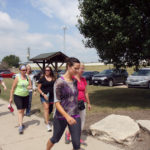
Pope Francis challenges us to reflect on and respond to the question “Who is my neighbor?” in his new encyclical “Fratelli Tutti, On the Fraternity and Social Friendship.” The question arises from his examination of the familiar parable, The Good Samaritan, and its relevance in today’s impatient, self-absorbed culture in which too many of us view one another with suspicion and as a threat.
Pope Francis unwraps the parable in layers in chapter two of Fratelli Tutti (https://tinyurl.com/y3u7z3cv), establishing the foundation for the encyclical that has been described as a call to recognize our connectedness to everyone. Convincing us to embrace our connectedness to everyone is no easy task today, nor was it for the faithful of Jesus’ time. Two millennia ago, in Luke’s Gospel, a lawyer posed the question to Jesus, “And who is my neighbor?” The lawyer really wanted to know who was not his neighbor. Does the same truth apply to us today? How often do we seek to exclude someone as our neighbor?
In the parable, a Levite and a priest ignore the man robbed, beaten and left on the roadside. They do not stop to offer assistance. “These were people holding important social positions, yet lacking in real concern for the common good. They would not waste a couple of minutes caring for the injured man, or even in calling for help,” Pope Francis says. The Good Samaritan stopped and personally cared for the wounded man and “gave him something that in our frenetic world we cling to tightly: he gave him his time. Certainly, he had his own plans for that day, his own needs, commitments and desires. Yet he was able to put all that aside when confronted with someone in need. Without even knowing the injured man, he saw him as deserving of his time and attention” (No. 63).
Pope Francis asks us to consider which of the characters in the parable we identify with and to acknowledge our tendency to play the role of passerby who ignores the other, especially the weak. We avoid situations until they affect us directly. “Each day, we have to decide whether to be Good Samaritans or indifferent bystanders,” the Holy Father says.
Perhaps we ought to consider that “all of us are, or have been, like each of the characters in the parable. All of us have something of the wounded man, something of the robber, something of the passers-by, and something of the Good Samaritan” (No. 69). As a victim, would we hope for someone to be our neighbor? To extend the hand and heart of mercy?
Jesus “asks us not to decide who is close enough to be our neighbor, but rather that we ourselves become neighbors to all (No. 80),” Pope Francis says. Let us consider the question, “Who is my neighbor?” in the Diocese of Davenport:
• A woman experiencing an unwanted pregnancy and struggling to decide whether to carry her unborn child to term.
• A young adult who attempted to end her life; the family of that young adult.
• A 90-year-old living in a nursing home who after seven months in quarantine and counting longs to see or talk with someone besides the staff.
• The 25-year-old college graduate in the early years of his career worried about paying the rent and keeping his job during the pandemic.
• The mom concerned about incidences of COVID-19 at her daughter’s middle school.
• A victim of gun violence; a perpetrator of gun violence.
• A frontline worker during the pandemic – healthcare worker; teacher; principal; school secretary; support staff; grocery store cashier, bagger, stocker or manager; delivery driver; janitor or housekeeper; meatpacking plant employee.
• An immigrant caring for her toddler and feeling discouraged because her husband has been detained by immigration officials for arriving in this country without legal permission.
• An inmate in prison, jail or other correctional facility in Iowa.
• A child or adult with special needs having a meltdown because of constant changes in routine.
• A farmer who has endured the pandemic, drought and the derecho.
Pope Francis calls for catechesis and preaching that speak more directly about the inalienable dignity of each person and our reasons for loving and accepting all our brothers and sisters. Answering the question, “Who is my neighbor,” must become a community-wide effort, the Holy Father says. Each of us, in our daily lives, has the opportunity to be a neighbor to someone in need. It requires an investment of our time — listening, helping, accompanying and praying.
Barb Arland-Fye, Editor
arland-fye@davenportdiocese.org











